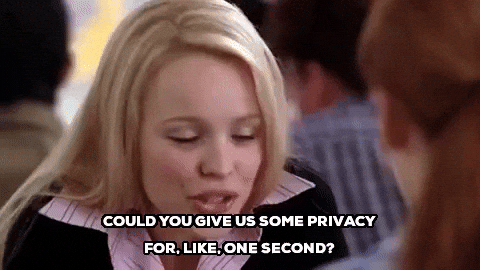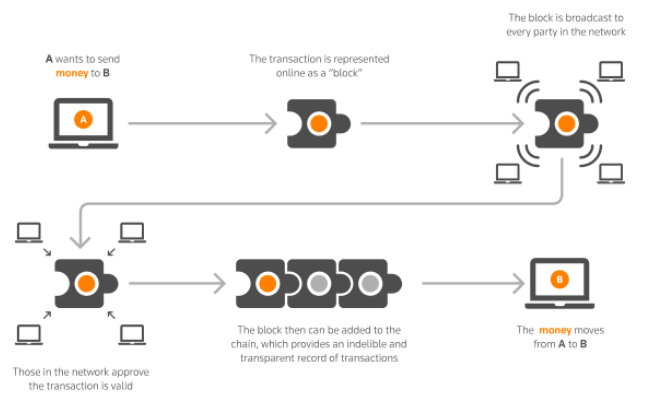Haha, yes Blockchain. We all know exactly what it is. I completely understood what people were talking about at that dinner party. It's like a new version of Minecraft right? Right?! 😰

Well, either way, it's a big deal, and a bigger market. In fact, it's projected to hit over $23.3 Billion by 2023, and $176 Billion by 2025. And on the other side, digital advertising is predicted to grow to $427.26 Billion by 2022. So, how can you combine these two powerhouses?
But before we outline the benefits, we better start with some definitions.
What is Blockchain?
Blockchain is fully decentralised, peer-to-peer, and unchangeable, data storage.
In basic terms, blockchain allows for transactions to occur between two parties, without the need for any kind of third party verification. It's a constantly growing list of records, linked together using cryptography, allowing for more anonymity and privacy.
So, it's a way of recording and storing information in a way that can't be erased or altered, or easily sourced back to the person making the transaction.
If you're transferring money, for example, the information will be recorded in a way which will point to another person in the network, basically obscuring your identity. This transaction information will be available to the blockchain users, but not your identity.
Plus, this process essentially removes the middleman host i.e. the bank. The whole thing typically runs without a centralised administrator, instead being run by a peer-to-peer network.
Each block contains a record of the previous block, a timestamp, and transaction data. So, blockchains are resistant to change, or modification, because they contain stamps of the previous blocks, and cannot be changed without changing all subsequent blocks. That's what makes the chain.
What is Digital Marketing?
This ones a bit easier. Digital marketing is pretty broad, and can involve fields like social media marketing, mobile marketing, analytics, ecommerce, and customer data mining.
Digital marketing is mainly about applying digital techniques and technologies to support marketing activities, in order to raise profit, customer acquisition, and customer retention.
It's basically any marketing that uses electronic devices in it's promotional messaging.
So, blockchain can give marketers a helping hand in a number of different ways, especially in regards to gathering and protecting information that is vital in effective digital marketing. Plus, it doesn't hurt that blockchain tech can reduce ad costs, and improve ad efficiency. But let's start with
1. Improved Security
Data security is a big old issue in digital marketing.
With the excessive level of data collected, stored, and used, there's always the chance it might be stolen or misused. With Blockchain, however, all transactions are verifiable and permanent, so security can be assured.

So, Blockchain allows for the gathering of high-quality data with a lessened threat.
Thanks to the structure of the chain, each data block is unchangeable, as we've mentioned before. So only the participants who have permission can access these verifiable, unalterable records. This means the flow of data is quick, automated, transparent, and obscured through cryptography.
Blockchain can also help with fraud detection, and support accountability in the supply chain. Blockchain tech can be integrated into other tools, in order to flag sites with click fraud and issues with bots, eliminating non-human engagement.
2. Privacy and Transparency
Up until the introduction of Blockchain, there was no solid way to verify company claims. Recently consumers have shown a tilt towards socially-conscious businesses, with distinct morals, but often have trouble making sure these claims aren't, well, just claims.
Blockchain allows for complete transparency about every transaction, every product, and every service. Every step of the supply chain will be recorded, so the customer can make a decision based on the information shared by the manufacturer.
"An Industrial Control Systems (ICS, e.g. T-Systems) writes all data into a blockchain that is synchronised for all participants, such as the manufacturer, shipping agent, and retailer," notes Björn Radde of marketingtechnews.net.
"This process enables consumers to get data on product origin and tracking information."
Recently, marketers have been looking into Blockchain tech when data inflation and discrepancy news emerged online. So, Blockchain was seen as a safer alternative to transparency.

Ad outlets, like Facebook Ads and Google Ads have, in the past, cheekily manipulated data to make a massive profit margin. So, Blockchain offers advertisers an alternative.
Advertisers have even recently sued several social networks for overstating ad metrics and video views, which have led to increased costs. Blockchain technology removes the risk of this happening in the first place, as information corruption is impossible. So, campaign managers won't have to deal with ad outlets, or ad vendor background checks or references. All the information will be instantly available and transparent.
Quite a lot of the benefits of Blockchain involve removing the need for 'trust'. This is no less true for customers. Blockchain removes a company's ability to use data from customers, without offering reimbursement for its value.
"The Brave Browser, for instance, is changing how users interact with online advertising," suggests Eric Sachs.
"Instead of being bombarded with online ads, Brave users receive basic attention tokens (BATs) for the ads they interact with. It’s a new way of viewing advertising by trading the value of attention online rather than trading the space for ad sales."
3. Improved Lead Generation
Data collection, right now, is done in a variety of different ways. This involves sourcing a bunch of info, from a bunch of sources, to use in a single campaign. But this means trusting the data you're using, which may be inaccurate, incomplete, or unreliable.

Because Blockchain transactions are decentralised, marketers can obtain data straight from their customers.
Basically, marketers will have to forget about standard marketing campaigns because users will be in control of how they consume content. So, alternatives will have to be looked for. Blockchain makes it almost impossible for third parties to obtain personal data, so that means marketers will need to be more creative in how they collect data for personalised experiences.
Although, despite the higher costs, the quality of this data is likely to be higher, and trust will be maintained.
Plus, instead of just asking for subscribers' data, and offering them targeted ads in return, Blockchain makes it easier to provide them with more valuable rewards. This might be loyalty tokens, NFTs, creator coins, etc. etc.


